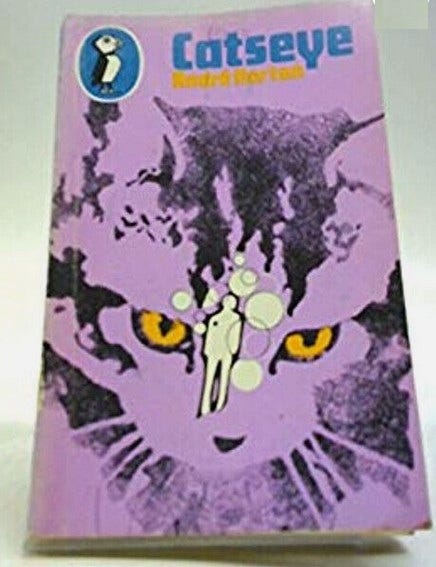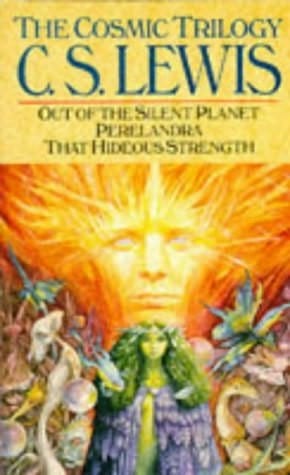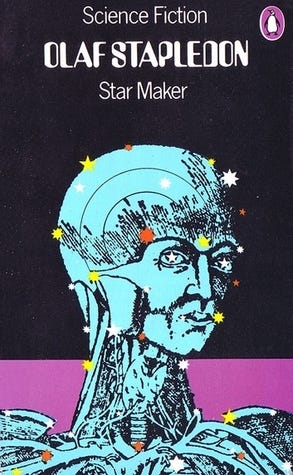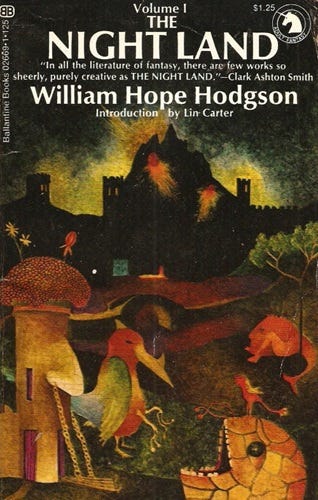This may come as something of a departure from my usual pieces but following along the lines of Community Building in Britain, my name is Chris and I feel moved to speak.
After a little over half a century, I re-read several books recently by the renowned author C. S. Lewis. I first read his Narnia series between the ages of eight and ten in the mid-nineteen sixties. With an atheist father and an agnostic mother, me and my brother had not had the slightest taste of religious education or instruction so I thoroughly enjoyed the Narnia books as simply marvellous stories. It was only much later that I began to retrospectively apply Lewis' undoubted Christianity to them.
By the age of eleven I had read Tolkien's Lord of the Rings1 for the first time and also discovered science fiction through André Norton's2 novel Catseye, in which the hero in a future of space travel, interacts with telepathic animals and helps them escape from captivity in a private zoo.
above: Alice Mary Norton, alias Andre Norton.
Though I found the Narnia books and Tolkien's epic fantastic reads, it was Catseye that really blew my mind or rather, opened the doors of my imagination. The former seemed to me to be rooted in conventional fairy tales, sagas or mythologies with which, for various reasons, I was already familiar, whereas the science fiction of Catseye came as something completely new to me and I realised that you could write a story about anything. From then on, I became a science fiction devotee, even an addict.
Its worth pointing out here that in the mid-nineteen sixties, science fiction was still largely an underground, cult genre. After Catseye, accompanying my mum on a weekly shopping trip to Wakefield, I went to each of the three bookshops there in turn asking if they had a science fiction section. Two of the shops had not heard of the term and the third, if they had any, just included it in with the regular novels. Huddersfield, had only two bookshops; the first hadn't heard the term either but in the second, the rather long haired proprietor proudly showed me to a half shelf (a short shelf) labelled science fiction and Fantasy. Bingo!
above: Andre Norton’s Catseye, in terms of opening the doors of my imagination, one of the most influential books I’ve ever read, probably, setting me on a course that still effects me 60 years on! A Puffin Book, junior version of Penguin Books, bought through our school’s Puffin Club- you saved at the rate of a couple of pennies a week and got a book at the end of each term. For some of my classmates, the club got them the first book they’d ever bought.
There were only about twenty titles in this section but it was better than nothing. Over the next few years, aided by rather unexpectedly winning two prizes at school, both book tokens, I worked my way through them- the science fiction of Olaf Stapledon, Isaac Asimov, Robert Heinlein, Brian Stapleford and fantasies by E. R. Eddison, William Hope Hodgeson, William Morris,3 (notice the absence of women writers).
The school and local libraries were soon exhausted, as were my parents shelves where I found H. G. Wells and the only other source I had available was the occasional second hand book stalls at markets. I remember one very successful day at Barnsley Market towards the end of the sixties. The book stall, on a long trestle table, had five or six rows of paperbacks, stacked side by side so the titles were visible on the spines. I worked my way along each row, pulling out anything that sounded like it might be science fiction and came away with four books, which I considered to be a huge success4.
Looking back it emphasises how, despite the Arthur C. Clarke-Stanley Kubrick collaboration on 2001 A Space Odyssey, Sci-Fi had still not really hit the mass market yet. Check out a charity shop or second hand book shop now and a large proportion of the trade will be Sci-Fi and fantasy novels and both are so laced into film and broadcast that the term has once again become meaningless to many folk. The books were far thinner on the ground back then but by the time I'd got to the age of seventeen I was the proud owner of a collection of some 300 science fiction, fantasy and horror novels.
Somewhere along the way, around the age of fourteen or fifteen I came across some other books by C. S. Lewis, Out Of The Silent Planet, Perelandra and That Hideous Strength. Reading the back covers I decided they were in fact science fiction and so worth getting.
I freely admit when I read them I was a bit baffled. Looking back from half a century on, very little of them remained in my memory. At the time I was still at an early stage of appreciating science fiction (a bit like the genre itself) favouring space travel, robots, hard science and the like. In Out Of The Silent Planet the hero, Ransom, is kidnapped by “the baddies”, Weston and Devine and is whisked off to Malacandra (Mars) to be offered as a sacrifice to the inhabitants.
I found the space ship (a rather Wellsian sphere with no explanation of the propulsion system or energy source) rather unconvincing and the exploits on the planet seemed to me at the time to be a bit weird to say the least. There was a lot about the language of Malacandra and very little dialogue or action, as I understood action to be in science fiction. All I could remember of Perelandra (Venus), was something about floating islands and that in That Hideous Strength there was a disembodied head.
The trilogy left me feeling pretty baffled and thinking that I seemed to have missed something. By then I was ware of Lewis' Christianity but I couldn't see how it related to the novels. Oh well, they went into my library with the rest and I just got on with the next SF book that turned up.
I gave away most of this collection over the years, hanging on to just a dozen or so that had meant a lot to me at the time. So, fast forward half a century and I'm checking out the books in our local Hospice shop and lo! What do I find but C. S. Lewis' Out Of The Silent Planet, Perelandra and That Hideous Strength complete in one volume and called The Cosmic Trilogy. Needless to say, I bought it and now we finally get towards the point; having reread the three novels in fairly short order, my name is Chris and I am moved to speak.
I really want to talk about That Hideous Strength but I'll mention the first two novels in the series briefly.
Out Of The Silent Planet, where Ransom meets and interacts with various Malacandrian races, is very good at creating a totally different, alien world and species to go with it. After his initial fears, Ransom comes to recognise the beings from the various races as equivalent to himself and becomes used to his new friends and the Malacandrian environment, so much so that when he meets up again with his pursuers, Weston and Devine, at first he fails to recognise them as human and sees them instead as very oddly formed aliens.
Lewis has Weston encapsulate the idea of scientific progress and the dominance of man over nature. His intentions are to eradicate the Malacandrian life to allow for colonisation from Earth. Devine is more mercenary and is after Malacandrian gold which is abundant but not valued by the inhabitants. This should all be familiar from colonisation in the age of empires.
As Ransom learns the Malacandrian language, Lewis is able to explore some interesting ideas about morality. So the three intelligent races on Malacandra, while physically differing radically, are all Hnau, as is Ransom.
Perelandra is even better at creating a completely different world. Ransom is transported there by an Eldil, a being of the high heavens and finds himself on a floating island with lush vegetation. This is beautifully described as the island conform to the ever changing contours of the ocean. So as he attempts to walk, the island may appear as a deep valley between high hills but the next moment it has became a ridge, then a a slanting plain rushing down the slope of an enormous wave then once more a valley and so on
.above: Olaf Stapledon’s Starmaker. The future history of the entire universe. An amazing work of imagination that prefigures many of today’s challenges.
Without giving too much away, he encounters a female Perelandrian and is able to communicate, to an extent, the Malacandrian language being in fact an interplanetary language. Their exchanges allow Lewis to explore the difference between intelligences.
The reappearance of Weston in his sphere adds a third person to the argument. Weston's ideas have evolved but Ransom grows to realise that Weston is in fact possessed by something supremely evil that is intent on corrupting the female Perelandrian. Ransom sees his purpose in being brought to Perelandra is to resist Weston's corrupting influence. The exchanges between the three become an increasingly desperate moral argument as the Perelandrian appears to fall under Weston's spell. This leads eventually to Ransom's violent intervention and there's a sustained, brutal fight between the two men.
The finale, after a tortuous, underground journey by Ransom, a rebirth, is reminiscent of the ending of The Last Battle in the Narnia series, a long paean to a world and people embodying a spiritual core.
That Hideous Strength feels initially very different. It is a much more mature work, dealing with similar themes but far more developed and grounded in Lewis' contemporary reality with a broader cast of characters. The story is confined to our planet and an ordinary sort of Britain towards the close of the second world war. The plot revolves around the various characters, some based in a backwoods academic institution, having to take sides.
On the one hand is the attitude that humans have no longer any need for nature:
"In us organic life has produced Mind. It has done its work. After that we want no more of it. We do not want the world any longer furred over with organic life, like what you call the blue mold— all sprouting and budding and breeding and decaying. We must get rid of it. By little and little, of course. Slowly we learn how. Learn to make our brains live with less and less body: learn to build our bodies directly with chemicals, no longer have to stuff them full of dead brutes and weeds. Learn how to reproduce ourselves without copulation."
What's so good is the way Lewis begins this so innocently, in a rather decrepit academic institution in a rural backwater. Under this new influence, the university expands, digging up previously pristine land and polluting the watercourses but its all seen as progress and "a good thing" yet becomes increasingly chilling as the story goes on;
"It is for the conquest of death: or for the conquest of organic life, if you prefer. They are the same thing. It is to bring out of that cocoon of organic life which sheltered the babyhood of mind the New Man, the man who will not die, the artificial man, free from Nature. Nature is the ladder we have climbed up by, now we kick her away."
Its a highly prophetic novel and prefigures the contemporary idea that we will be able to upload our individual consciousnesses to computers and exist as purely digital entities, thus achieving immortality (ho, ho, ho! Sorry, just have to laugh...)
Without giving too much away, Lewis shows how the very attitudes and behaviours of the characters acting against nature are corrupting and distorting in themselves, as well as the obvious destruction and pollution of the natural environment; that is, those who pollute the Earth are also polluting themselves, both body and mind. Its an interesting and engrossing read and builds to a very satisfying ending, a nice mix of the dramatic and the ordinary.
That's it for now. If you have novels, whether fiction, science fiction, fantasy or whatever, that have influenced you in the past, I'd love to hear about them. Alternatively, if this has not interested you, please let me know! Next Konsk is coming very soon. Take care all. Hwyl! Chris
Its worth pointing out that Tolkien thought fantsy was a serious form of fiction in which serious issues could be explored, such as leadership, heroism and the like. He felt that the real hero or heroes should be ordinary people, not a king or great general; Frodo is even less than an ordinary person as he’s a halfling. Tolkien is also very clear in his writings about fantasy, that the turning point, the Eucatastrophe as he called it, should involve the giving up of power, rather than the wielding of power and also that the tale should not end there but the heroes should return to their own land and bring back with them their new knowledge and experience to solve the challenges there. Its also worth remembering that he was writing in the patriarchal times (the era, not a newspaper) hence his work appears very one sided now.
Incidentally, André Norton was in fact Alice Mary Norton writing under a pseudonym in order to get her work accepted as a writer of science fiction in the patriarchal times (not a newspaper, as far as I know, more of an era). I began to suspect this when I went on to read her remarkable Witchworld series with its strong feminine and feminist slant.
I could bang on about this for ages but here are some brief details of some of those early writers and the works that influenced my thinking
Olaf Stapledon: Last and First Men: written in 1930, a remarkable imagining of the future evolution of humanity over the next 40 million years and introduces the concept of the supermind. Star Maker: not content with just 40 million years, Olaf imagines the entire future history of the universe. An even better read and much shorter, Olaf envisions the universe attempting to become wholly self conscious before the heat death ends everything. Also prefigures failed worlds where the inhabitants' bodies are sustained in tanks while their minds' live in virtual realities. Oh oh.
Isaac Asimov: prolific writer but I Robot and The Rest of the Robots are good examples. He invented the Three Laws of Robotics to govern his AI robots behaviour and then explored in short stories how things would go horribly wrong. Interestingly, AI experts today are considering using his Three Laws of Robotics to control their own constructions. Again, oh oh.
Robert Heinlein: another prolific writer, generally hard science, strong on the mechanics and weak on character, particularly the women...
Brian Stapleford: prolific British writer who I actually met and shared a stage with at the Cardiff Literary Festival in 1990 (if I remember correctly...) along with Reverend Lionel Fanthorpe and the late, great Terry Pratchett. Lionel was employed by an early SF publisher to write a novel every week. They would send him the cover with the title, picture and blurb on the back and he would thrash out the novel to fit the cover. He described the Blaster as a useful device for getting his hero out of trouble in the last few pages, thus copying the 2,000 year old Greek Tragedian technique of Deus Ex Machina, where a god or goddess descended over the stage in a machine and magically sorted everything out when the tragedian had got them into too much of a fix.
above: the Reverend Lionel Fanthorpe. Quite a character to say the least (!) and a biker. Writer of over 200 pulp SF novels.
E. R. Eddison: The sadly unfinished Zimiamvian Trilogy and The Worm Ouroborous. Fairly unique fantasies and interesting alternatives to Tolkien.
William Hope Hodgeson: pretty far out early fantasies/science fiction. The Nightland is particularly odd and darkly disturbing. Very good on big timescales.
above: The Nightland, William Hope Hodgson. Darkly disturbing far, far future Earth where something is seriously wrong.
William Morris: yes, the Arts and Crafts Movement guy. Very old-school, traditional fantasy along the lines of regular myths, legends and "fairy stories". The Wood Beyond The World is one example but he also wrote an Arts and Craft Movement based utopian novel, News From Nowhere which is a very interesting read.
Two of these were absolute rubbish but no matter, they were still science fiction and went onto my shelf. One of them was At the Mountains of Madness, a collection of stories by a writer I'd never heard of, H. P. Lovecraft who became a great favourite for his blending of brooding horror with science fiction elements and a sense of vast stretches of time. I remember reading At the Mountains of Madness in the delirium of glandular fever when my temperature peaked at 105⁰, a remarkable experience and probably not one to repeat... I almost certainly suffered some brain damage due to the high temperature which is probably what led to my later encounter with Multiple Sclerosis. Its also quite possible that the fever broke down a mental gate and allowed the Old Ones to enter our reality. (I am only kidding with that bit, I think).







